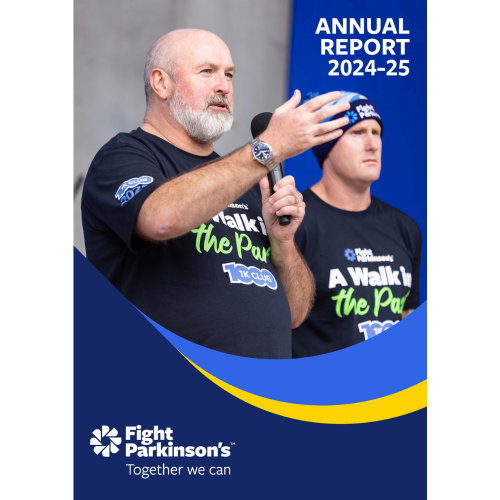Fight Parkinson’s advocates for the needs of those living with Parkinson’s to government and healthcare professionals and strives to improve education in the healthcare sector.
Types of advocacy
Fight Parkinson’s supports three types of advocacy:
- Systemic advocacy
To influence the ‘system’ (e.g., the policies and procedures of agencies / government health policy) to change in response to people with the condition and their families / carers. - Self-advocacy
To support people with Parkinson’s, their families and carers, to speak up for themselves. We help the Parkinson’s community to develop or maintain the personal skills and self-confidence necessary to enable them to represent their own interests in the community. - Group advocacy
To facilitate community organisations to represent the interests of groups of people with Parkinson’s, their families and carers.
Systemic advocacy by Fight Parkinson’s
Advanced care planning
Final review of Advance Care Planning: Having the conversation. A strategy for Victorian health services 2014-2018: This document is a tool for healthcare professionals to start conversations about advance care planning. Fight Parkinson’s Director of Health Services Victor McConvey OAM has been a member of the Health Department working party, comprised of health and legal professionals from across government and non-government sectors.
Speech pathology Australia Senate enquiry
Fight Parkinson’s on behalf of Parkinson’s Australia developed a response to the Senate Enquiry into speech pathology services with a focus on the needs of people with movement disorders.
Agency for Clinical Innovation
Fight Parkinson’s participated in a review facilitated by the Australian College of Nursing of the clinical guidelines for Percutaneous Endoscopic Gastrostomy (Feeding tubes) insertion. This is often a complex decision for people with progressive neurological conditions and contribution ensures that these conditions and there ongoing needs are included in the document.
Dopamine agonist class action update
Fight Parkinson’s collaborated with the Salvation Army’s gambling counselling division for several years on a class action. The class action related to people who were affected by gambling whilst taking dopamine agonists during the period where developing an impulse control disorder – which was an increasingly known side effect – was inconsistently communicated to people on these medications.
Continence Foundation of Australia collaboration
Fight Parkinson’s collaborated with Continence Foundation of Australia on a series of informational videos with healthcare professionals discussing the continence issues in Parkinson’s.
Medicare Local community consultation – Barwon & Golden Plains
Collaboration with progressive neurological organisations promoting an online survey and community forum to identify which services would be helpful for people with progressive neurological conditions in the region.
Executive summary of the Parkinson’s Access Economics Report
This report provides facts and figures about the economic cost of Parkinson’s to the Australian community and is a useful source of information for advocacy purposes.
Download the Executive Summary of the Parkinson’s Australia Access Economics Report.
Self advocacy
Advocating for change in the lead to federal & state elections
The strength of any advocacy campaign lies in individuals who are willing to share their stories and show local representatives how government action can improve the lives of people with Parkinson’s and their carers.
Useful tips
- Approach your local member of parliament and local opposition member.
- Write a letter to them outlining your personal story regarding your experience with Parkinson’s and ask them to address your needs.
- Explain how greater investment by government will lead to real improvements for both you and others
- Include information about you, your circumstance, two or three key issues for you / your family and how the situation could be improved
- Ensure your letter is no more than 400 words.
- Write / call and request a meeting to discuss your story.
- Prepare for your interview as it’s likely to be short i.e. 15 minutes. Know what you want to say (2-3 key issues) and ask your politician to do something for you.
- Make your request specific i.e., request the local member speaks with the relevant minister / shadow minister.
- As the meeting concludes, clarify what was agreed on, the timeframe and how progress will be communicated.
- It’s important to stay in contact, so write and thank them for their time and restate any commitments made.
- Share your advocacy with family and friends. Let them know about your campaign and your approach to the local members. Ask them to join you or write letters of support.




